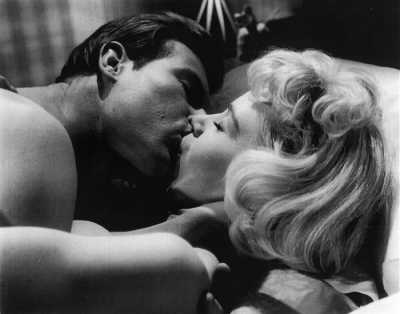Victim
|
Published: 17 July 2005 Dirk Bogarde had it
exactly right about Victim. In his autobiography, Snakes and
Ladders (1978), he looked back on 1961 and said, "It is extraordinary, in
this over-permissive age, to believe that this modest film could ever have been
considered courageous, daring or dangerous to make. It was, in its time, all
three."
Victim, re-issued this month, is not a
great film; it is not as revelatory as The Servant, the picture Bogarde
made in 1963. No matter. "Janet Green's modest, tight, neat little thriller,
for that is all it was fundamentally, might not have been Shaw, Ibsen, or
Strindberg, but it did at least probe and explore a hitherto forbidden Social
Problem, simply, clearly, and with great impact for the first time in an
English-speaking film."
Until 1966 and the Wolfenden Report, homosexual
acts between consenting adults were illegal in Britain. There were prosecutions
and Sunday newspapers that gave space to the court reports. Yet, by 1960, the
police were as relaxed as possible over the old laws. There was a feeling that
the code violated decent liberty. But police restraint did not deter the menace
of blackmail. |

|
|
The bleak little story of Victim
concerns a successful solicitor, Melvin Farr (Bogarde), who has a thriving
London practice. He is likely to take silks; and people are already talking of
a judgeship. He is apparently happily married to a wife played by Sylvia Syms,
who was in those days one of the most attractive leading ladies in British
film.
But Farr is approached, in desperation, by
"Boy" Barrett (Peter McEnery), one of his former lovers. Farr rebuffs the
approach and not long afterwards Barrett hangs himself in a police cell.
|

|
The vicious blackmailing ring closes in, and Farr
becomes their most notable victim. His marriage is nearly destroyed. But Farr
agrees to help the police, to give evidence in court, no matter that the worst
Sunday papers will destroy his career.
When the team of producer Michael Relph and director
Basil Dearden first approached Bogarde, they warned him that a lot of people
had already turned down the script - because the material might be dangerous or
unwholesome. Bogarde in 1960 was 39, and just about the most popular star in
British films. He had proven himself playing war heroes (The Sea Shall Not
Have Them; Ill Met by Moonlight); he was the centrepiece in the
hugely successful Doctor in the House series; and he was a reliable
romantic lead in movies like A Tale of Two Cities. He was flirting with
a larger, Hollywood career - playing Liszt in Song Without End. Bogarde
was also a confirmed homosexual, happily "married" to his business manager,
Tony Forward, though compelled every now and then to be seen in public with
attractive young women to divert suspicion.
Bogarde seems not to have hesitated over the role of
Farr. Similarly, Sylvia Syms never flinched from the part of his wife, though
apparently several actresses had turned it down. Not that Victim is a
complete picture. There is a central compromise in that Farr seems to have
outlived his homosexual past and to be genuinely in love with his wife. Their
marriage survives, even if Farr's career is shot. Bogarde gives a very moving
performance, but he never took the opportunity to admit, or even to hint, that
he and Farr had things in common. On the other hand, Victim served to
separate the star from his fond, young following and to pave the way for The
Servant, Darling, Modesty Blaise, Accident,
Justine, The Damned, Death in Venice and The Night
Porter.
Granted a proper sense of history, the tight little
thriller stands up pretty well. Otto Heller's black-and-white photography
captures the wintry gloom of London. The cast is rich in supporting
performances (look for Dennis Price, Nigel Stock, Hylton Edwards), and we are
left in no doubt about the suspicion and paranoia induced by the laws against
homosexual behaviour. Equally, the film misses (or ignores) the tremendous
dark, theatrical humour of the gay community.
But there's a coda to the story that is unexpected or
depressing. Dirk Bogarde had taken a brave step, and he had assisted in the
making of an authentic film of protest - part of the mood that would soon
liberalise the law. Bogarde was also established in other ways by the time of
his death, in 1999. He was by then a respected actor; a successful writer (both
memoirs and novels); and someone knighted by the Queen. But to the very end,
Sir Dirk lacked the inner freedom to admit to his own emotional life. In other
words, the repressive forces of English fear and respectability oppressed him
still, no matter that the law had been reformed. That is the surest testimony
to the clammy anxiety of Victim.
David Thompson
Independent, 17.7.05.
'Victim' is re-issued at selected
cinemas on 29 July 2005.
Cast
|
barman
Melville Farr
Laura Farr
Detective Inspector Harris
Bridie
Harold Doe
Jack Barrett
Lord Charles Fullbrook
Calloway
Paul Mandrake
Eddy Stone
sandy youth
Scott Hankin
Phip
Henry
Madge
William
Patterson
P.H.
Mickey
Miss Benham
Frank
Sylvie
barber's
assistant |
Frank Pettit
Dirk Bogarde
Sylvia
Syms
John Barrie
John Cairney
NormanBird
Peter
McEnery
Anthony Nicholls
Dennis Price
Peter Copley
Donald
Churchill
Derren Nesbitt
Alan MacNaughton
Nigel Stock
Charles Lloyd
Pack
Mavis Villiers
Noel Howlett
Hilton Edwards
David Evans
Margaret Diamond
Alan Howard
Dawn Beret
Frank
Thornton |

